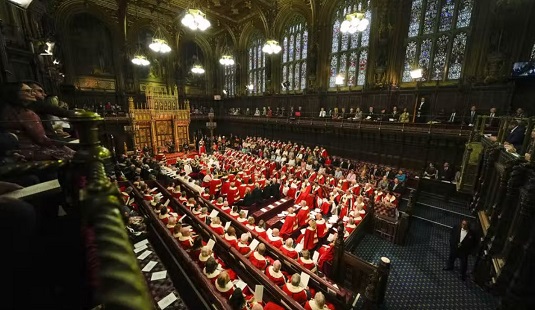
Labour are set on abolishing the House of Lords if it wins the next election, says Keir Starmer. At a speech of assembled Lords and Ladies, he said the Tories' habit of packing the Lords with cronies, failed MPs and beloved donors was undermining confidence. Instead, the second chamber should be fully elected but carry on its function of scrutinising and amending legislation. It would not become a rival centre of power to the Commons. Its size and nuts and bolt details (term limits? Electoral system? What to do with the bishops?) are to be determined, as are the fates of newly appointed Labour members - the latest tranche of which are due to take up their seats in early December. Pretty unambiguous and said at a time when Starmer is under no pressure to sugar coat his intentions.
The Tories don't like it. It would, apparently, undermine the Union. Quite how, they don't say. And it would clash with elected politicians in the Commons and the devolved governments. Again, not necessarily the case given its competencies are unlikely to exceed those the Lords currently enjoys. I.e. The most it could do is delay the government's plans and lay down some annoying amendments. Unsurprisingly, the Tories have an interest to declare. When Dave justified the constituency boundary readjustment way, way back in the Coalition years, weeding out 50 or so MPs was about reducing the cost of politics. Funnily, this never applied to the Lords. Since 2010, the growth trajectory has been upwards. There are now 786 sitting members and where, coincidentally, the Tories are the largest party. Removing this unelected hindrance on the desires of a Labour government should be something any Labour leader would seek to do.
Yet, we're back at a familiar contradiction. Keir Starmer is authoritarian and, among other things, Starmerism is an authoritarian political project. But, as per the enthusiasm for trade unions, where does the desire for more democracy fit in? Like a hand in a glove, as it happens. The Fabian tradition, which is core to Starmerism is not a dictatorial politics, but rather an elite managerialist politics adapted to liberal democratic conditions. Electorates are asked to choose between a cadre of elites every four or five years to run government, and they get on with the business of politics while the little people return to spectator status at best, but most usually indifference. Opening up another set of elections would not fundamentally change this. After all, devolution hasn't (whereas Corbynism would have).
It's also part and parcel of Starmer's strategy to restore the legitimacy of state institutions. And in this, offering democratic reforms are a sequel to the limited modernisation of the UK constitution carried out by Tony Blair. On top of referenda on devolution, Lords reform was carried out as well. Hereditary peers were expelled from the Lords in 1999, apart from a bridging group of 92 to tide the place over while reforms were implemented. There was promise of more to come, but it never did - finally getting killed by the Tories, despite having agreed to an elected chamber with the Liberal Democrats. Blair's motivation was to restore faith in the state by using limited reform as a means of bedding down the politics of (New) Labour and, in Scotland's case, addressing the alienation from Westminster that had grown worse under the previous 18 years of Tory rule.
For Starmer, Lords reform can't be divorced from his bigger package of measures. He knows there's no clamour for it in the real world, but it's a quick and relatively cost-free means of telegraphing his intentions as a change-minded politician, albeit one more interested in overhauling the form of UK democracy than deepening its substance.
Image Credit
‘Yep, yep, yep”, as my Grandson would say:
ReplyDeleteYep, there's no clamour for it in the real world but it's quick and relatively cost-free.
Yep, Keir Starmer is authoritarian in the Fabian tradition. Let’s not forget that the Fabians supported a programme of eugenics in the interwar years.
Yep, this is all a tedious distraction. So much so, I don’t know why I’m replying to this blog piece…..